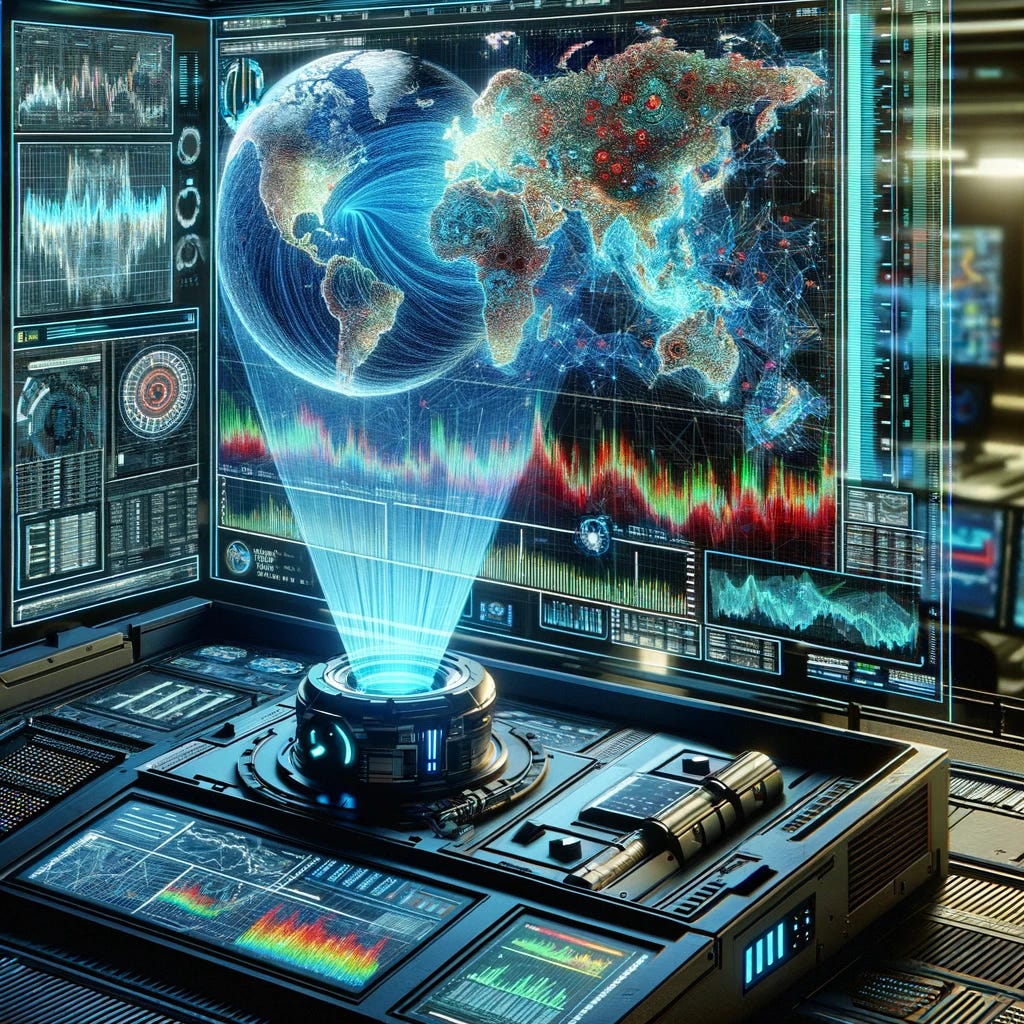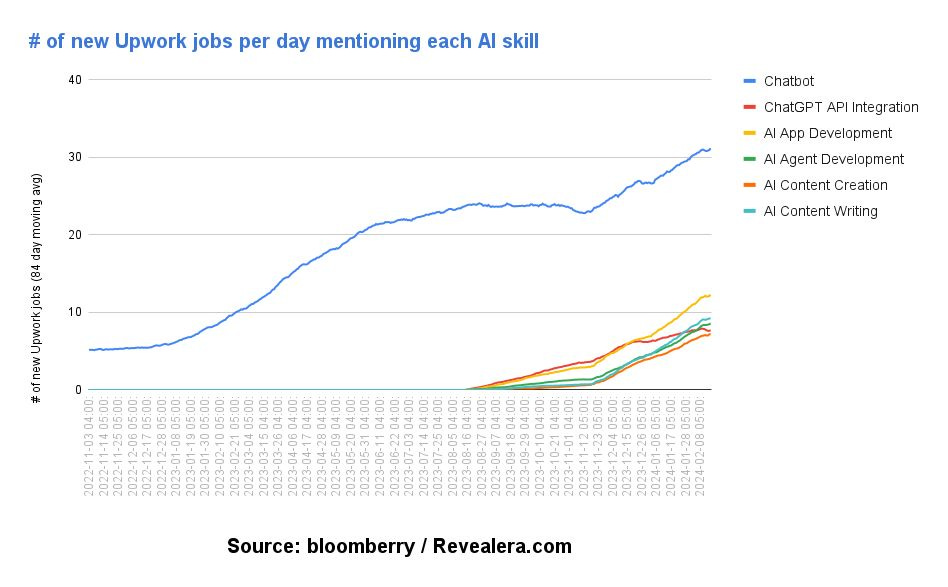Today I’ll expand the scanner series to include business and economics. The idea here is to better understanding how AI intersects with the world, by looking into different domains. That’s a solid way to prepare for forecasting AI futures, and for situating AI in higher education. Obviously economics is a crucial field.
We’re going to look into AI business models, some investment patterns, and the vexed question of what AI might do to jobs.
How can a business make money with AI?
Things are cloudy and challenges are growing. For one, the business model for generative AI remains in flux. Enterprises are trying out various structures to gain revenue enough to balances very substantial LLM expenses: freemium, licensing, per-token charges, subscriptions to AI services; charging more for products with AI embedded in them.
Examples are everywhere. Google, for example, launched a big subscription drive, but also embeds generative AI across a range of its services. Eleven Labs wants to pay to use your cloned voice. Mastercard is offering AI as a security function. None other than the Wall Street Journal thinks there is no solid business model yet.
National interests are having an impact on AI and economic sustainability. For more, read on:
Investments and partnerships
Apple is reaching out to other businesses for AI capacity. Cupertino allegedly negotiated with Google and some AI startups for their software. Apple also apparently (ungated) contacted Baidu to use that company’s tools for Apple’s hardware sold in China.
Last week I repeated my theme of nations taking a bigger role with AI, including carving out nation-specific applications. Now catch this note from the WSJ article: “Apple rival Samsung’s newest Galaxy smartphone uses Gemini outside of China and Baidu’s Ernie in China to power some AI features.” And compare with the news that Anthropic is fundraising to the tune of at least one billion… turned down Saudi Arabian money - for security reasons. Once again, nationality shapes AI development.
AI and labor
Will generative AI take away current jobs? Will we create new, AI-focused jobs at scale? These are powerful and old questions which we need to address, and there’s evidence of answers nearly every day. For example, the Swedish firm Klarna laid off 700 staff a few months ago, and now claims AI does the work of all of those ex-employees.
The app-based AI chatbot already handles two-thirds of all customer service chats, the company said Tuesday—some 2.3 million conversations so far—with the virtual assistant earning customer satisfaction ratings at the same level as human agents. Klarna, which is expected to go public this year and will need all the hype it can get at a time when investors have been generally frosty toward IPOs, estimates that the chatbot could help improve its profits by $40 million in 2024.
Elsewhere, Henley Wing Chiu looked at freelance work data from late 2022 to early 2024 and shared some interesting findings.
Job offers in customer service, social media marketing, translation, and writing declined, with writing down by one third. Those jobs also saw hourly pay drop. Intriguingly,
video editing/production jobs are up 39%, graphic design jobs are up 8%, and web design jobs are up 10%. Software development jobs are also up with backend development jobs up 6% and frontend/web development jobs up 4%…
I was surprised to see graphics design, video editing/production, and even software development jobs go up, given all the anecdotal stories we’ve been hearing about people using ChatGPT to generate code, illustrations and even full featured videos...
one takeaway from this is that graphic design + web design jobs are still in demand, and not being replaced by AI tools yet. [emphases in original]
Interesting, within the overall category of “AI jobs,” one subcategory really stodd out:
Why chatbots? I think it’s the enormous buzz around ChatGPT, but Chiu adds: “I think one takeaway from this is that the vast majority of companies aren’t doing sexy stuff like developing their own LLMs models or tuning them with lots and lots of training data. It’s in integrating OpenAI’s API into their existing products and developing chatbots to replace customer service agents.”
MIT professor Daron Acemoglu takes a different approach (article; presentation), starting by analyzing the impact of automation on jobs over recent decades, then trying to see the impact of AI in the present. One very early finding is that “AI is replacing human workers in some occupations.” He calls for changes to tax policy, public investment, and worker activism to make sure we don’t end up with:
so-so automation [which] tend[s] to reduce employment growth and worsens the distribution of income — esp. when there is excessive automation due to policy or vision distortions. The problem is even worse when automation is not counterbalanced by new tasks.
That’s a lot to chew on for this issue, so I’ll stop here to ask you questions:
What do you think of these developments?
Are there other AI economics stories we should track?







I would be surprised if we did not start seeing more radical job market changes across the rest of this decade. Software development, law, customer services seem some areas ripe for disruption. This could speed-up rapidly if there is a GPT-5 class model released in the next few months.
Re: Economics of the Music Industry
"In 2023, it was announced that The Beatles were releasing their final song, “Now & Then”. This was an interesting piece of news given that two of the group’s members had been dead for decades. The song was made possible by advances in stem separation powered by AI.
In short, John Lennon recorded a demo at his home in 1977 that the remaining members of The Beatles tried to complete in the mid-1990s. The problem was that the demo was very noisy and Lennon’s piano playing sometimes drowned out his voice. Jump forward to today and a neural network was able to extract Lennon’s voice from the demo with incredible clarity, making it possible for Paul McCartney and Ringo Starr – the two living Beatles – to finish the song.
While this technology has already become accessible through companies like LaLaL, Deezer, and Serato, it will likely continue to improve and enable a whole slew of new things. For example, we might be able to remix and remaster degraded recordings from decades ago. Furthermore, a producer who is looking to sample a piano from an older recording will be able to extract the sound without hearing the bleed from the other instruments."
https://aisupremacy.substack.com/p/ai-and-the-future-of-music-production